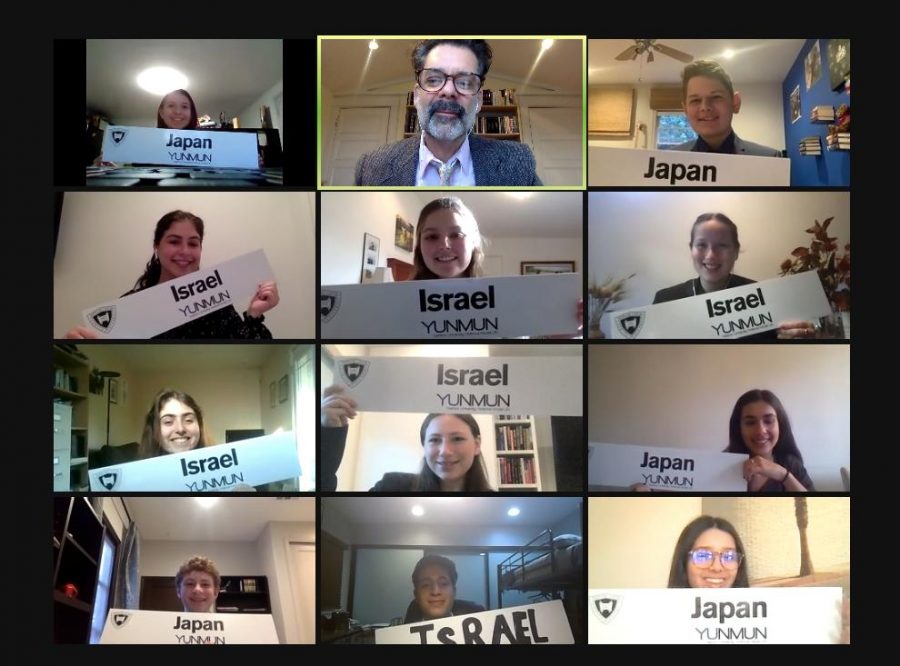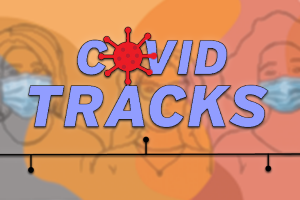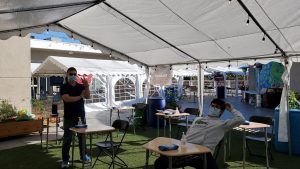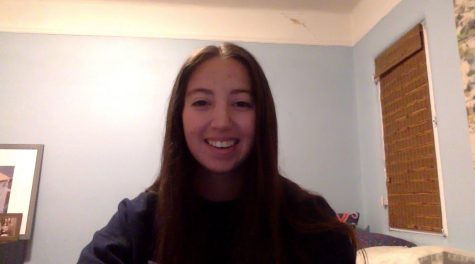Moving screens, louder voices and ‘breakout’ committee rooms as debate teams move online
Mock Trial, Model Congress and YUNMUN face different obstacles in virtual competition
COUNTRIES: Shalhevet’s debaters represented Israel and Japan at last month’s Yeshiva University Model UN conference, held Feb. 14-15 over Zoom. Dr. Harris took this screen shot of a team meeting just before the conference began.
March 3, 2021
Shalhevet’s Model Congress, Mock Trial and Model UN teams have all competed virtually this year due to Covid-19. And though students miss the camaraderie of traveling together, getting to know their opponents, and the being in a real courtroom, perhaps surprisingly, there have been some pluses.
“Since we have to be speaking while debating with our masks on, it might help us project and be louder,” said sophomore Elliot Serure, who’s on the Model UN team. “So that might even be something that seems like a bad thing, but ends up helping us in a way.”
Sophomore Avi Litvak of the Model Congress team liked the virtual mood.
“The structure was the same and we still gave speeches normally obviously,” said Avi, “But the difference was that it was a bit less formal, I would say. Because when you’re in person, you’re there, and you have to be with people. But if you’re online it’s a little bit less intense and more relaxed.”
And junior Adina Kurzban, in her first year on the Mock Trial team, said it was encouraging to see a government institution adapt to the virtual world.
“It was cool to see how the court system was able to work even as the society isn’t able to meet in person,” said Adina.
Still, most other comments were complaints. Usually held in places like Washington, D.C., Stamford, Conn. or L.A.’s downtown courthouse, this year’s conferences have all been held online, and some practices have as well. All are completed now except one — Penn Model Congress, set for April 9-11 online, instead of in Philadelphia.
The Mock Trial team coped with technical difficulties and missed being face-to-face with opponents playing the different roles. Shalhevet played defense attorneys while another school played the prosecution team in an aiding-and-abetting case.
Junior Barbara Seruya said that during the trial, the judge would ask each person to identify who they were portraying in the case each time they spoke.
“It was frustrating that we didn’t get the whole experience because we were all on Zoom and we weren’t in a courthouse,” said Barbara. She added that the interaction among students was also changed.
“I speak better in front of people,” she said. “I like seeing the looks from my peers when I do well and I like a little encouragement, but because it was on Zoom we didn’t really get that experience.”
Also, at the team’s first meet Nov. 10, it took 40 minutes from the start time until the contest began.
“There were 300 kids on the Zoom call,” said Barbara, “so it took some time to put us into rooms, which makes sense, but it was still really disorganized. I understand why it was like that, because this isn’t something that they usually do.”
They won their first competition, but lost the second. Team co-captain Sivan Karz said competing virtually was a fact of life this year.
“We have a competition, it’s gonna be online,” said Sivan. “We’re happy it’s happening in some capacity. Obviously it’s not ideal, but it’s exciting that we still get to compete.”
Zoom had a different more measurable effect on Shalhevet’s Princeton Model Congress team, which competed Nov. 13 and 14 online instead of in Washington, D.C.
The schedule had to be changed to accommodate debaters simultaneously in different time zones. That meant Shalhevet’s team had to miss a greater proportion of the conference for Shabbat — so instead of competing on Friday and again on Saturday night, this year it was Friday only for the Firehawks. They missed a full day.
That meant they missed fully half of their committee sessions and all of the full sessions — compared to last year, when they only missed a quarter of committee sessions and a third of full sessions due to Shabbat.
“It was sad,” said Adina Kurzban. “The fun part is being with your friends on the trip.”
But the team was still able to bring home three Honorable Mentions for Best Delegate. Senior Samson Taxon won in Small Business and Entrepreneurship, senior Rena Harkham in Education and the Workforce, and sophomore Keira Beller in Environment and Public Works.
And though the setting was noticeably different, the conference itself worked well on Zoom, students said.
“In Model Congress we break up into smaller committees,” said Samson. “So even if we were in person we’d still be broken up into rooms with 12 or 15 people. So it was pretty similar.”
He said that typically, Model Congress members would compete sitting together around a conference table, which he said feels more professional.
“[This] felt a little bit like class at Shalhevet,” said Samson. “So we had our [committee] chair, who kind of acted like a teacher and ran the show. And then when we wanted to talk we used the raise-hand feature in Zoom. But we still dressed up as if it were the real conference and did our best to make it feel really real.”
Avi Litvak said the similarities were bigger than the differences.
“In the normal competition that’s in person, there’s a bunch of different rooms with maybe around 15 kids in them,” said sophomore team member Avi Litvak. “And that’s basically what it was on Zoom. The structure is essentially the same.”
Yeshiva University Model United Nations, which was held this year Feb. 14 and 15, set up its own online platform on Zoom. Still, hosting 400-500 debaters brought complications.
Known as YUNMUN, the conference involves debating resolutions, studying problems and creating groups with other people to debate possible solutions, in this case all with people seen through a screen.
“On Zoom what they had us do was raise our virtual hand every time we wanted to speak,” said Gaby Bentolila. “It was a little overwhelming at first because when people raise their hands, every single screen starts to move, so it was a little confusing. But in order to be called on you had to do that, so that’s what everyone was doing.”
But that made it harder to gain the attention of committee chairs, she said, especially without the “placards” — the physical card each team normally has at its table with their country’s name on it, so it’s clear who they’re representing whenever they speak.
“It wasn’t about if you raised your hand first or if you raised your hand last — it was just about the Zoom order,” Gaby said. “And so you weren’t being called on as much as if we were in person or using our physical placard.”
This year’s conference was also shortened from three days to one.
“It happened all in one day so it was a little overwhelming at first,” said Gaby, “but it was much better than dragging it on for several days on Zoom.”
The team didn’t win any awards, but the members still enjoyed the conference.
“Obviously it’s not the same,” Gaby said, “but they stuck to what they’ve done in the past which was good.”
Model UN practices were the same as usual, except for masks and location. Sophomore Gitty Rav-noy missed the camaraderie of holding practice in team members’ homes.
“Usually would have done practices at someone’s house to make it feel more inclusive and fun to the new members,” said Gitty, who represented Japan this year.
This year, she said, “we have to do everything at school under protocol and having a mask on, so we don’t really get to know the new members of the team. But for the most part, the school and everyone is making it the best it can be.”
Making the best of an unfortunate situation seemed to be a goal of all of the events.
Gaby Bentolila, a co-captain of the Model UN team, praised the way competition’s organizers came up with ways to keep social interaction alive, even on Zoom.
“We had different times where we got to bond with the people from other schools,” Gaby said, “and in different committees they had ‘hotel chills’ — which was everyone went on a Zoom and we went into different breakout rooms and met other delegates.”
“It was really fun, still,” she added.
















